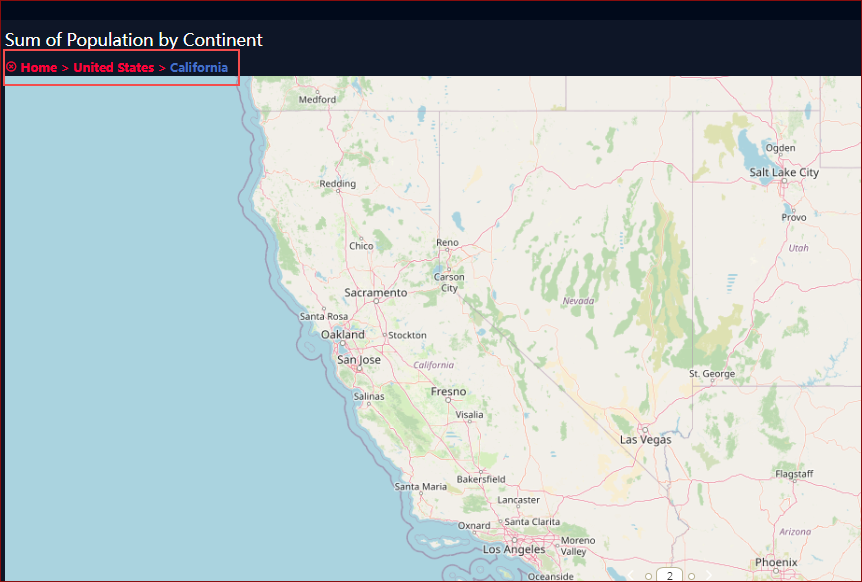- Getting Started
- Administration Guide
-
User Guide
- An Introduction to Wyn Enterprise
- Document Portal for End Users
- Data Governance and Modeling
- Working with Resources
- Working with Reports
-
Working with Dashboards
- Dashboard Designer
- Selecting a Dataset
- Data Attributes
- Dashboard Scenarios
- Dashboard Templates
- Component Templates
- 3D Scene
- Explorer
- Visualization Wizard
- Data Analysis and Interactivity
- Dashboard Appearance
- Preview Dashboard
- Export Dashboard
- Dashboard Lite Viewer
- Using Dashboard Designer
- Animating Dashboard Components
- Document Binder
- Dashboard Insights
- View and Manage Documents
- Understanding Wyn Analytical Expressions
- Section 508 Compliance
- Subscribe to RSS Feed for Wyn Builds Site
- Developer Guide
Drill Down
Drill Down feature allows users to explore the details of hierarchical data. You can drill-down into the dimensions for granular details and you can also drill-up for summarized information. For example, in a dashboard showing the sales revenue for retailers in various countries, you can drill-down to view the sales revenue filtered by country. You can drill-down further to explore the sales revenue for specific product lines sold within that country. You can drill-down even further into product types and individual product SKUs sold within that country.
Cross-filters applied to an associated scenario on applying drill down will retain the cross-filter for all related scenarios as described in the following example. Column chart displays Revenue by Year and the pivot table shows the Gross profit by Year.
When a particular Year is selected from the column chart, the data in the pivot table is filtered for the selected year automatically.
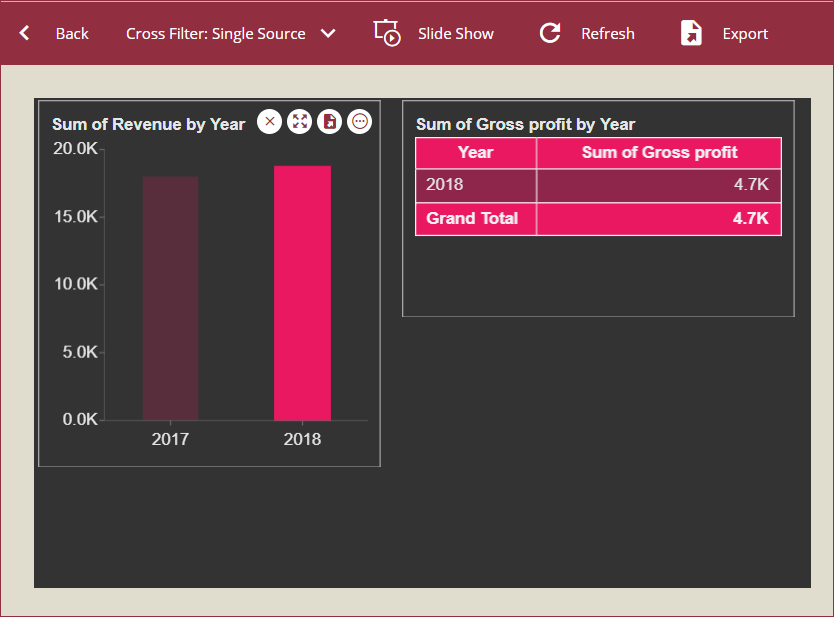
On using the Drill Down feature to drill down to a Quarter in the selected Year, the pivot table will retain the data of cross-filter applied earlier.
Please note that from Wyn Version 7.1 onwards, there is a change in the display of drill down breadcrumb. For example, if you select the year and drill down to the Quarter, then the breadcrumb will be shown as below.
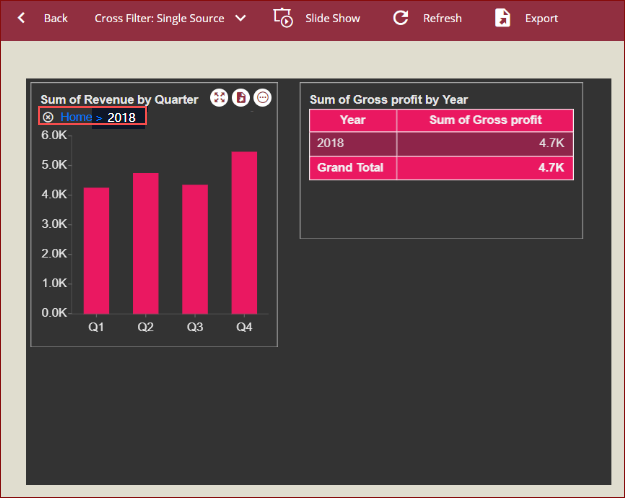
While analyzing a scenario through Drill Down, the default behavior is to visualize the list of all available dimensions in the dataset, allowing you to easily navigate the hierarchy. You can change the default drill-down behavior in the data-binding step. While binding the data to the scenario, set the Drill Down mode to Pre-set Targets or Pre-set Path.
Pre-set Targets
This feature allows you to drill-down into the data to a selected target dimension. While creating the scenario, you can select a dimension from the list and drill into it.
From the data binding area, set the Drill Down Mode to Pre-set Targets.
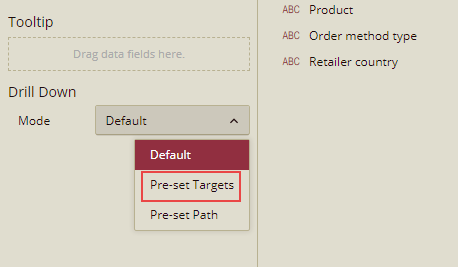
Drag the dimensions into the Drill Down Targets area. For example, to enable drill-down into - Product Line, Product Type, and Product, specify these dimensions in the drill-down targets.
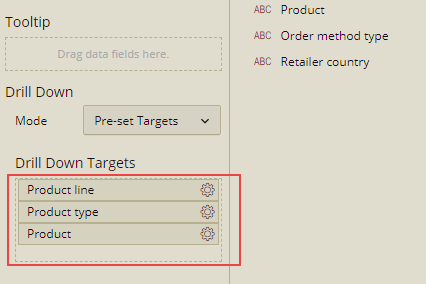
Preview the dashboard and one-by-one, select the targets from the 'Drill Down' option.
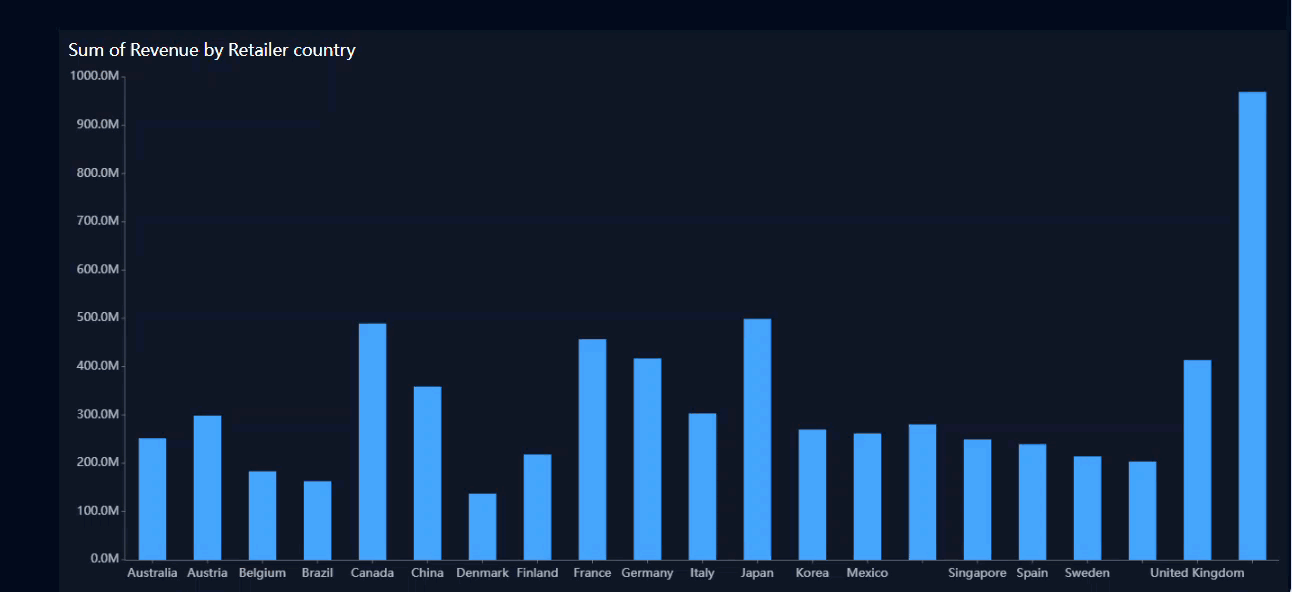
Pre-set Path
This feature allows you to drill-down into the dashboard in a defined target sequence or path. While drilling, each click takes you one level deeper in the data according to the pre-set path. It is important to note that the list of dimensions is not shown at any level of data.
From the data binding area, set the Drill Down Mode to Pre-set Path.
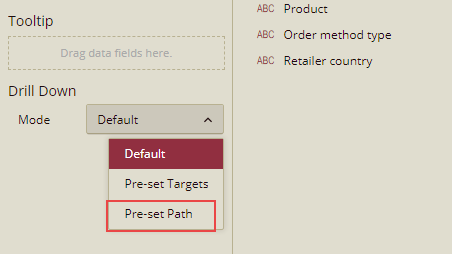
Drag the dimensions into the Drill Down Path area in the sequence in which you want the drill path to be created. For example, to drill down to the following path, Product Line >> Product Type >> Product, drag these dimensions in this sequence.
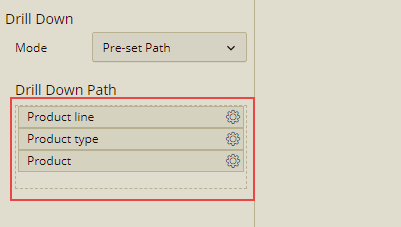
Preview the dashboard and click the 'Drill Down' option. To go one more level deep, again click the 'Drill Down' option. Each time you click Drill Down, you go one level deep according to the path set in the target.
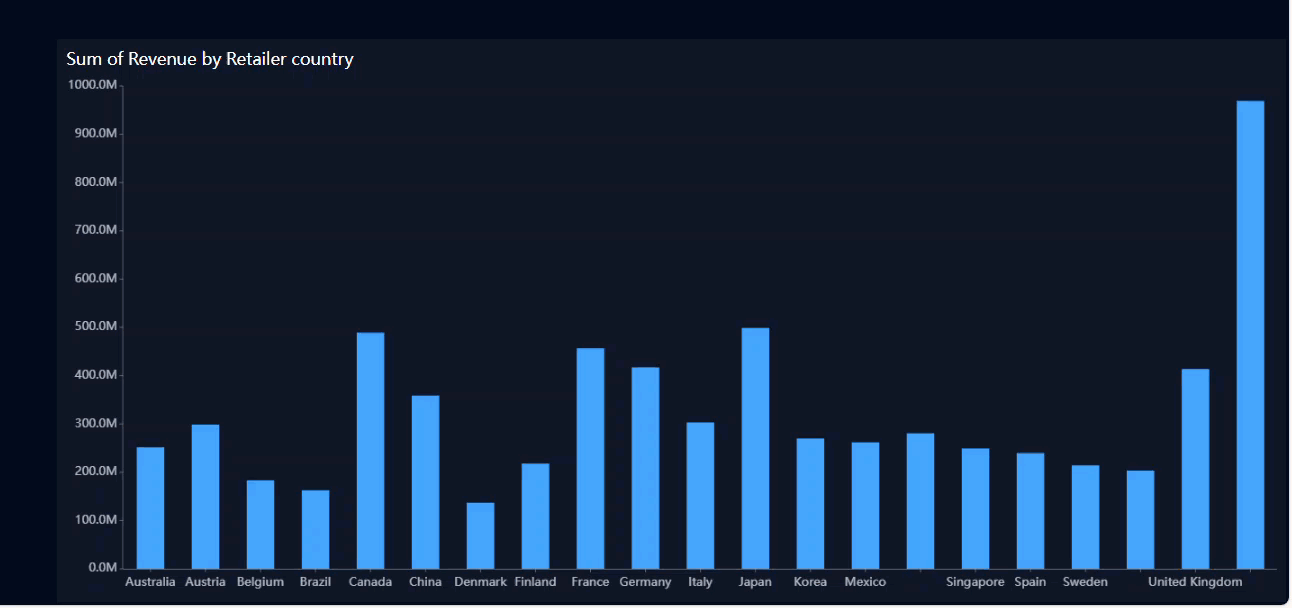
Please note that when there is no selection and you drill down, then the breadcrumb will show the Column name on the drill path as shown below.
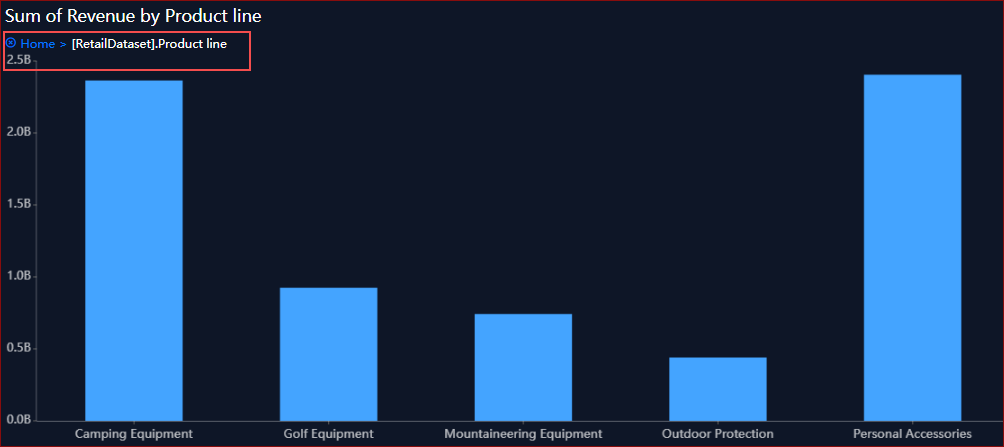
Drill Down Setting
You can set the display settings like style, position, and font color of the drill path, and change the initialized status text using the Drill Down Setting in the Inspector tab for the dashboard scenario.
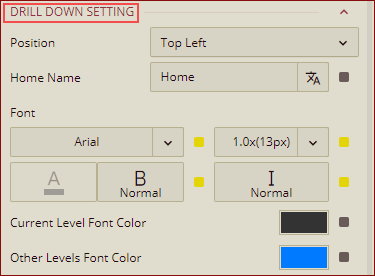
Property | Description |
|---|---|
Position | You can set the display position for the drill-down bar using this property. The dropdown list has the following options: Top Left, Top Center, Top Right, Bottom Left, Bottom Center, and Bottom Right. By default, the Top left is selected. |
Home Name | You can select the initialized text for drill down path to be displayed on the preview from here. By default, the value is Home. |
Font | You can set the font for the drill-down path from the font settings. |
Current Level Font Color | You can pick the color for the current level text in the drill-down path by using this property. |
Other Levels Font Color | You can pick the color for the other level text in the drill-down path by using this property. |
Example: In the below example, we will show the steps to apply the drill down settings for the drill down path display.
Take a column chart and bind the data set. From the data binding area, set the Drill Down Mode to Pre-set Path.
Drag the dimensions into the Drill Down Path area. For example, to enable drill-down into - Product Type, Product Line, and Product, specify these dimensions in the drill down path.
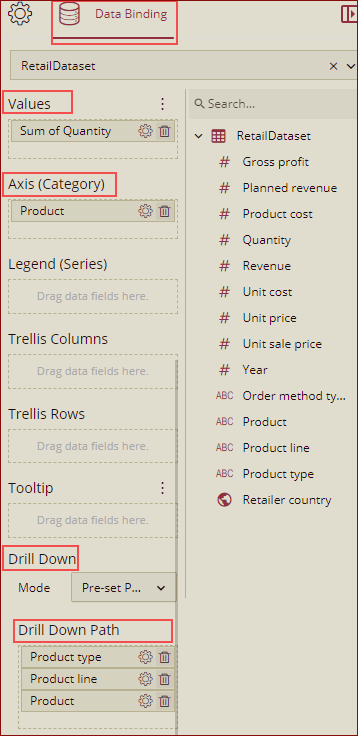
Click the Inspector tab and select the Drill Down Setting.
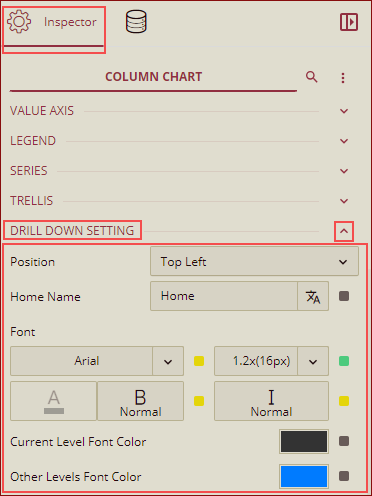
Set the properties as per your requirements. In this example we have done the following settings:
Position: Top Center
Home Name: Home
Font Type: Arial Black
Current Level Font Color: Blue
Other Levels Font Color: Orange
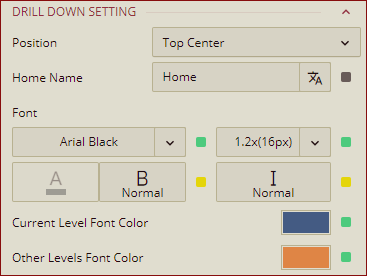
Preview the dashboard and one by one, select the paths from the 'Drill Down' option.
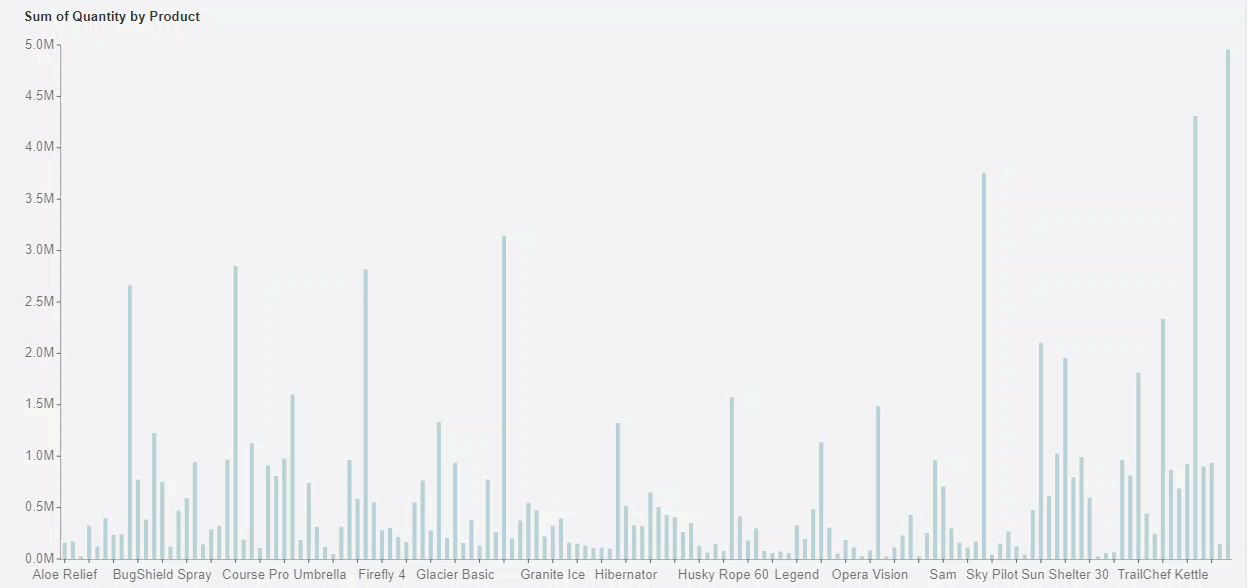
Drill Down in Map Area
You can display drill down path for the Map Component. For the Map component, you need to set the property Display In Map Area to True in the drill down setting, to display in the map area. By default, it is set to False.
When this property is True, the drill down path is displayed in the Map area as shown below.
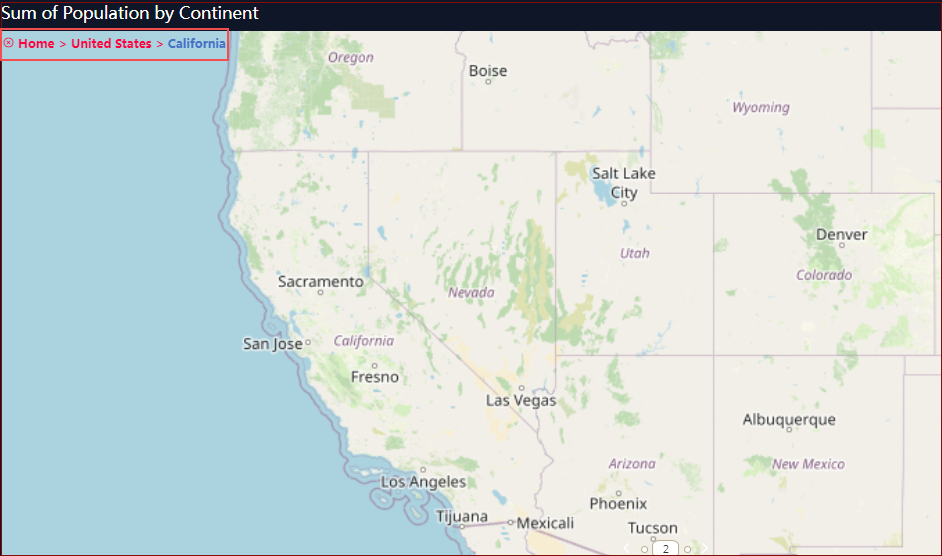
When this property is set to False, then the drill down path is displayed as show below.
